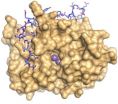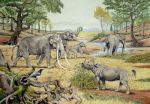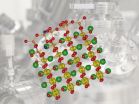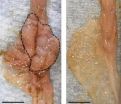(Press-News.org) BLOOMINGTON, Ind. -- Many Americans are confused about the best ways to conserve water and have a slippery grasp on how much water different activities use, according to a national online survey conducted by an Indiana University researcher.
Experts say the best strategy for conserving water is to focus on efficiency improvements such as replacing toilets and retrofitting washing machines. However, the largest group of the participants, nearly 43 percent, cited taking shorter showers, which does save water but may not be the most effective action. Very few participants cited replacing toilets or flushing less, even though toilets use the most volume of water daily.
The results of the survey of 1,020 participants are detailed in the article "Perceptions of Water Use" by author Shahzeen Attari, an assistant professor at Indiana University Bloomington's School of Public and Environmental Affairs. The article appears the week of March 3 in Proceedings of the National Academy of Sciences.
"People may be focusing on curtailment or cutting back rather than efficiency improvements because of the upfront costs involved," Attari said. "It is also surprising how few participants mentioned retrofitting their toilets. Even though toilets use less water volumetrically than washers and showers per use, the frequency of use results in the highest water use overall."
The survey then asked participants to estimate water used by 17 different activities such as using a carwash, taking a shower for 10 minutes, using a standard flush and so on. Results show that on average, participants underestimate water use by a factor of two, with severe underestimates for activities that use a lot of water. This is somewhat encouraging news as Americans seem to underestimate water use less than they do energy use, which was underestimated by a factor of about three, as illustrated by Attari's previous research also published in PNAS.
Many side factors lead to better accuracy in people's perceptions of water and energy use. For instance, participants with stronger pro-environmental attitudes have more accurate perceptions of energy use but not for water use. Being older and being male lead to more accurate perceptions of water use but not energy use. Finally, numeracy, or the ability to understand and apply numerical concepts, is an important factor for accuracy in both water and energy use perceptions.
Finally, and not surprisingly, participants had no clue about how much water was needed to produce four particular foods: rice, coffee, sugar and cheese.
"Given that we will need to adapt to more uncertain fresh water supplies, a problem that the state of California is currently grappling with, we need to find ways to correct misperceptions to help people adapt to temporary or long-term decreases in freshwater supply," Attari said.
INFORMATION: END
We want to save water, but do we know how?
2014-03-03
ELSE PRESS RELEASES FROM THIS DATE:
Experimental stroke drug also shows promise for people with Lou Gehrig's disease
2014-03-03
Keck School of Medicine of USC neuroscientists have unlocked a piece of the puzzle in the fight against Lou Gehrig's disease, a debilitating neurological disorder that robs people of their motor skills. Their findings appear in the March 3, 2014, online edition of the Proceedings of the National Academy of Sciences of the United States of America, the official scientific journal of the U.S. National Academy of Sciences.
"We know that both people and transgenic rodents afflicted with this disease develop spontaneous breakdown of the blood-spinal cord barrier, but how these ...
Big stride in understanding PP1, the ubiquitous enzyme
2014-03-03
PROVIDENCE, R.I. [Brown University] — In the Proceedings of the National Academy of Sciences, a team of scientists at Brown University reports a major step forward in determining the specific behavior of the ubiquitous enzyme PP1 implicated in a wide range of diseases including cancer.
PP1, whose role is to enable the passage of molecular messages among cells, is found pretty much everywhere in the body. Its wide range of responsibilities means it is essential to many healthy functions and, when things go wrong, to diseases. But its very versatility has prevented it from ...
Mount Sinai study points to new biological mechanisms, treatment paradigm for kidney disease
2014-03-03
New York, NY – Prevention and reversal of chronic kidney disease is an urgent public health need. The disease affects 1 in 10 Americans, is debilitating and deadly, and existing drugs, at best, offer only mild delay in progression to end-stage kidney failure. New research led by Icahn School of Medicine at Mount Sinai investigators has uncovered abnormal molecular signaling pathways from disease initiation to irreversible kidney damage, kidney failure, and death. Results from their preclinical and human research are published online March 3 in the Journal of Clinical Investigation.
"Our ...
Researchers identify 'carbohydrates in a coal mine' for cancer detection
2014-03-03
Researchers at New York University and the University of Texas at Austin have discovered that carbohydrates serve as identifiers for cancer cells. Their findings, which appear in the journal Proceedings of the National Academy of Sciences, show how these molecules may serve as signals for cancer and explain what's going on inside these cells, pointing to new ways in which sugars function as a looking glass into the workings of their underlying structures.
"Carbohydrates can tell us a lot about what's going on inside of a cell, so they are potentially good markers for ...
New discovery solves problem of anti-inflammatory substance
2014-03-03
There have been great expectations regarding the production of a drug to block the enzyme LTA4 hydrolase, which plays a key role in the body's inflammatory response. However, in clinical trials, such molecules have proven to be only moderately effective. Now, researchers at Karolinska Institutet have successfully refined their understanding of why previous substances have been less effective – and in so doing have produced a molecule that gets around the problem. Consequently, there is once again hope of a new anti-inflammatory drug based on the principal of blocking LTA4 ...
Large mammals were the architects in prehistoric ecosystems
2014-03-03
Researchers from Denmark demonstrate in a study that the large grazers and browsers of the past created a mosaic of varied landscapes consisting of closed and semi-closed forests and parkland. The study will be published on Monday 3 March 2014 in the renowned journal PNAS (Proceedings of the National Academy of Sciences of the United States of America).
Dung beetles recount the nature of the past
The biologists behind the new research findings synthesized decades of studies on fossil beetles, focusing on beetles associated with the dung of large animals in the past ...
Electronics based on a 2-D electron gas
2014-03-03
Usually, microelectronic devices are made of silicon or similar semiconductors. Recently, the electronic properties of metal oxides have become quite interesting. These materials are more complex, yet offer a broader range of possibilities to tune their properties. An important breakthrough has now been achieved at the Vienna University of Technology: a two dimensional electron gas was created in strontium titanate. In a thin layer just below the surface electrons can move freely and occupy different quantum states.
Strontium titanate is not only a potential future alternative ...
Gut microbes spur development of bowel cancer
2014-03-03
It is not only genetics that predispose to bowel cancer; microbes living in the gut help drive the development of intestinal tumors, according to new research in mice published in the March issue of The Journal of Experimental Medicine.
Bowel cancer, also called colorectal cancer, results from a series of genetic changes (mutations) that cause healthy cells to become progressively cancerous, first forming early tumors called polyps that can eventually become malignant. Although mutations can occur anywhere in the human intestine, certain types of colorectal cancer tend ...
In academia, men more likely to cooperate with lower-ranked colleagues
2014-03-03
In academic circles at least, women tend to cooperate with same-sex individuals of higher or lower rank less often than men do. So say researchers who report evidence on March 3 in the Cell Press journal Current Biology. The findings are based on a study of the publication records of professors working at 50 North American universities.
"People are often upset to hear evidence of sex differences in behavior," says Joyce Benenson of Harvard University. "But the more we know, the more easily we can promote a fair society."
The findings might seem somewhat counterintuitive. ...
People with sleep apnea may be at higher risk of pneumonia
2014-03-03
People with sleep apnea appear to be at higher risk of pneumonia than people without, according to a study published in CMAJ (Canadian Medical Association Journal).
Sleep apnea is characterized by disrupted sleep, caused when the upper airway becomes obstructed by soft tissue, cutting off oxygen. It has been linked to several types of heart disease and cognitive impairment. People with obstructive sleep apnea are at higher risk of aspiration while sleeping.
To determine whether sleep apnea is linked to the development of pneumonia, Taiwanese researchers followed 34 ...





